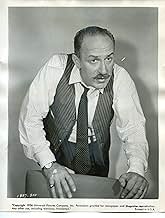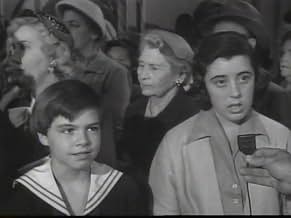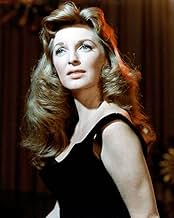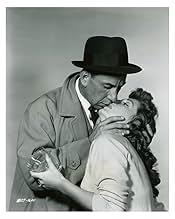Añade un argumento en tu idiomaJoe Harris, preparing a eulogy for popular radio commentator Herb Fuller, finds that nobody has a good word to say about him.Joe Harris, preparing a eulogy for popular radio commentator Herb Fuller, finds that nobody has a good word to say about him.Joe Harris, preparing a eulogy for popular radio commentator Herb Fuller, finds that nobody has a good word to say about him.
- Nominado a 1 premio BAFTA
- 3 nominaciones en total
Edward Platt
- Dr. O'Connor
- (as Edward C. Platt)
Dorothy Abbott
- Stewardess
- (sin acreditar)
Walter Bacon
- Mourner
- (sin acreditar)
Reseñas destacadas
I've often been chastised for posting obits in which I have been less than flattering about the person who has passed on; not nasty by any means, merely truthful about their shortcomings. In "The Great Man" that is the dilemma facing Jose Ferrer; should he sing the praises of the 'Great Man' of the title, a recently deceased and much loved, at least by the people who only saw his public face, radio and television personality or should he tell the truth and expose him for the monster he was.
Ferrer's film came out around the same time as Elia Kazan's "A Face in the Crowd" and while Kazan's film, which plays out in much the same ballpark, has gone on to become a classic, Ferrer's remains virtually unseen; personally I think it's a great picture, a testament to Ferrer's often undervalued talent. There are no great cinematic flourishes here, as there are in "Citizen Kane", another film that Ferrer's has often been compared to. This is a simple, literary piece, almost a series of talking heads as Ferrer, who also stars, interviews those who knew 'the great man', including his mistress, an excellent Julie London, and best of all, Ed Wynn as the man who first discovered him. Wynn's magnificent here, (he was nominated for both the Golden Globe and a BAFTA), and Ferrer is canny enough to give him his dues. As Wynn describes his feelings Ferrer allows his camera to slowly creep up on him. He only has this one scene but it's one of the great performances by an actor in a supporting role. His son Keenan is also superb as another executive out for what he can get. As I've said, this movie is almost impossible to see, at least here in the UK, but if you get the chance take it; it's one of the best American films of the fifties.
Ferrer's film came out around the same time as Elia Kazan's "A Face in the Crowd" and while Kazan's film, which plays out in much the same ballpark, has gone on to become a classic, Ferrer's remains virtually unseen; personally I think it's a great picture, a testament to Ferrer's often undervalued talent. There are no great cinematic flourishes here, as there are in "Citizen Kane", another film that Ferrer's has often been compared to. This is a simple, literary piece, almost a series of talking heads as Ferrer, who also stars, interviews those who knew 'the great man', including his mistress, an excellent Julie London, and best of all, Ed Wynn as the man who first discovered him. Wynn's magnificent here, (he was nominated for both the Golden Globe and a BAFTA), and Ferrer is canny enough to give him his dues. As Wynn describes his feelings Ferrer allows his camera to slowly creep up on him. He only has this one scene but it's one of the great performances by an actor in a supporting role. His son Keenan is also superb as another executive out for what he can get. As I've said, this movie is almost impossible to see, at least here in the UK, but if you get the chance take it; it's one of the best American films of the fifties.
I fully agree with the reviewers who call this film a neglected or overlooked gem. I was drawn to watch it by the excellent cast - Jose Ferrer, Dean Jagger, Jim Backus, and assorted character actors who do outstanding work. And of course the Wynns, both father and son, in what is probably one of the few - if only - films they made together. Another draw was the rumor that Arthur Godfrey may have been the "great man" on which the story is built. Regardless of that, it's a superb portrayal of the cynicism of the entertainment world. As is made clear, selling product is the be-all and end-all, and a star's good or bad personal qualities are irrelevant. As many reviewers have said, Ed Wynn's brief appearance is a reminder of how great an actor he was. I think his son Keenan acquits himself also, and Dean Jagger is always good. I applaud Jose Ferrer's scriptwriting and direction, but I think his performance is a bit stiff and dry. The only reason I gave 7 stars and not 8 is that I thought the conclusion was a bit abrupt. However it is a very good, well acted story that is well worth watching.
The Great Man stars Jose Ferrer, Dean Jagger, Keenan Wynn, and Ed Wynn. It is, at times, a brutal portrayal. Of the radio (and I suspect TV) business, similar to the electric "Network" that was to come out 20 years later. Dean Jagger gives the performance of his career, and Keenan Wynn also gives the performance of his career, as well. Ed Wynn is very good, and Jose Ferrer is very convincing in the lead. A great radio personality dies, and a reporter gathers all he can about him before broadcasting an hour eulogy. Like most people of the world, the radio personality is neither good, nor bad, but human. So, the reporter must decide whether to do a hatchet job or a puff piece. Some very interesting dynamics.
Jose Ferrer should be better known as a director. Yes, it has some of the plot of Well's Kane, but it has more of the feel of a Jack Webb flick, he himself a greatly under rated director. Even Julie London, Webb's wife is in it.. Hard boiled hero, quirky supporting characters that are given a rounded humanity, and a great cast. See this film when it plays on Turner. And check out Webb's non Dragnet films; 30, the DI, Pete Kelly's Blues and The last time I saw Archie.
The immense influence Orson Welles' CITIZEN KANE (1941) has had on the language of cinema is well documented. So, to a lesser degree, is the freedom it gave film-makers – not always of comparable talent – towards (vaguely autobiographical) self-indulgence in their work. Yet another ripple it undeniably created (actually borrowed from THE POWER AND THE GLORY {1933}, which I own but have yet to watch!) led to a whole series of films taking a sour look at the American dream, depicting – via their flashback structure – the rise and fall of a successful but, at heart, unscrupulous public figure. Among these are RUTHLESS (1948), ALL ABOUT EVE (1950), THE BAD AND THE BEAUTIFUL (1952), Welles' own MR. ARKADIN aka CONFIDENTIAL REPORT (1955), THE Oscar (1966), etc.
THE GREAT MAN, then, is one such effort – and an unfairly neglected example into the bargain (even if both the Leslie Halliwell and Leonard Maltin movie guides are duly complimentary in their assessment) which rather suggests that it stands up better than other, more renowned titles in this vein! It also emerges as the most significant directorial venture by star/co-writer Ferrer. For the record, I own all 7 of the pictures he helmed – but, perhaps tellingly, this was only the second I have checked out (and which I opted to watch on the occasion of his birthday). Given the Oscar winner's reputation as a thespian, his choice of 'personal' projects was – for the most part – curiously bland and commercial in nature!
Setting this apart from the established formula is the fact that the subject of the expose' is never shown; we only learn about him – and, consequently, formulate our own opinion – from the way others (who knew him intimately, professionally or just vicariously through his popular radio show) react to news of his passing in a traffic accident. Besides, running concurrently with the main plot (the compiling of information by a small-time radio personality – played by Ferrer himself – for a "heart-rending" eulogy, to be delivered in a live broadcast by the network to commemorate "the great man") are the hero's conflicting emotions about his increasingly unpleasant and "phoney" task especially since he was being all but promoted as the deceased's successor on the airwaves!
Ultimately, the trump-cards here – which make all the difference – are the smartly cynical script (co-adapted by novel author Al Morgan) and a first-rate cast that, apart from Ferrer (in fine form), includes: real-life father and son Ed and Keenan Wynn (credited with, respectively, discovering and nurturing the ungrateful and opportunistic titular character); Julie London (as a chanteuse and his alcoholic mistress); and Dean Jagger (as the Machiavellian network head). Incidentally, the copy I viewed of this one was pretty substandard for the digital era (which has well and truly spoiled us movie-buffs, it must be said!) and, while a somewhat better-quality version does exist online, I had difficulty acquiring it...
THE GREAT MAN, then, is one such effort – and an unfairly neglected example into the bargain (even if both the Leslie Halliwell and Leonard Maltin movie guides are duly complimentary in their assessment) which rather suggests that it stands up better than other, more renowned titles in this vein! It also emerges as the most significant directorial venture by star/co-writer Ferrer. For the record, I own all 7 of the pictures he helmed – but, perhaps tellingly, this was only the second I have checked out (and which I opted to watch on the occasion of his birthday). Given the Oscar winner's reputation as a thespian, his choice of 'personal' projects was – for the most part – curiously bland and commercial in nature!
Setting this apart from the established formula is the fact that the subject of the expose' is never shown; we only learn about him – and, consequently, formulate our own opinion – from the way others (who knew him intimately, professionally or just vicariously through his popular radio show) react to news of his passing in a traffic accident. Besides, running concurrently with the main plot (the compiling of information by a small-time radio personality – played by Ferrer himself – for a "heart-rending" eulogy, to be delivered in a live broadcast by the network to commemorate "the great man") are the hero's conflicting emotions about his increasingly unpleasant and "phoney" task especially since he was being all but promoted as the deceased's successor on the airwaves!
Ultimately, the trump-cards here – which make all the difference – are the smartly cynical script (co-adapted by novel author Al Morgan) and a first-rate cast that, apart from Ferrer (in fine form), includes: real-life father and son Ed and Keenan Wynn (credited with, respectively, discovering and nurturing the ungrateful and opportunistic titular character); Julie London (as a chanteuse and his alcoholic mistress); and Dean Jagger (as the Machiavellian network head). Incidentally, the copy I viewed of this one was pretty substandard for the digital era (which has well and truly spoiled us movie-buffs, it must be said!) and, while a somewhat better-quality version does exist online, I had difficulty acquiring it...
¿Sabías que...?
- CuriosidadesLoosely based on the career of Arthur Godfrey.
- PifiasWhen Joe, Mike, and Jinny are listening to the "blood bank" tape, the VU meter has no relation to the audio.
- Citas
Ginny: Feet of clay, huh?
Joe Harris: Right up to the knees, at least.
- Créditos adicionalesFerrer modestly omitted himself from the cast list at the end of the film.
- ConexionesVersion of Pretendent (1987)
- Banda sonoraThe Meaning of the Blues
Words and Music by Bobby Troup and Leah Worth
Performed by Julie London
[The song comes on the radio in Carol's apartment]
Selecciones populares
Inicia sesión para calificar y añadir a tu lista para recibir recomendaciones personalizadas
Detalles
- Fecha de lanzamiento
- País de origen
- Idioma
- Títulos en diferentes países
- Marele om
- Localizaciones del rodaje
- Universal Pictures Building, 445 Park Avenue, Nueva York, Nueva York, Estados Unidos(Amalgamated Broadcasting building)
- Empresa productora
- Ver más compañías en los créditos en IMDbPro
- Duración
- 1h 32min(92 min)
- Color
Contribuir a esta página
Sugerir un cambio o añadir el contenido que falta






























